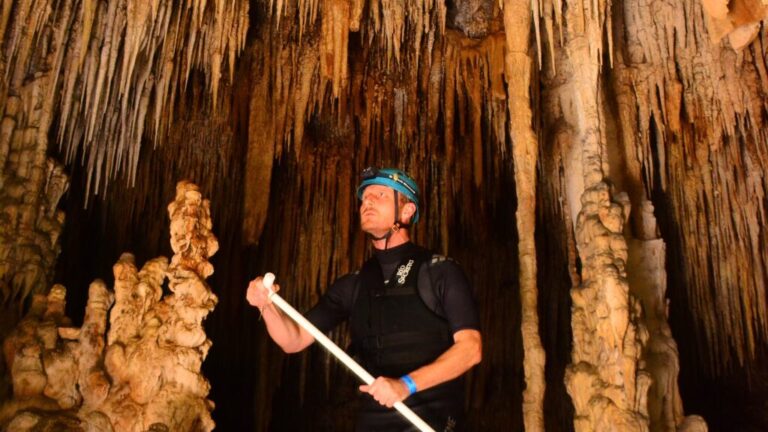Some 100ft underground, waist-deep in water and enclosed in a cavernous chamber whose stalactites make it resemble a cathedral, I’m concerned. Then the lights go out.
Where on Earth am I? The answer is the alluringly named Rio Secreto, a network of caves and waterways that stretches beneath the surface of Mexico’s Yucatan Peninsula. I can’t see my own hand. On our guide’s instruction, my companions and I have switched off our head torches. The darkness is so complete it’s scary.
However, all these concerns vanish as soon as we reach the first cavern. It’s dazzling. The ceiling of limestone resembles melting wax. The stone is, in fact, dissolving. It’s just that the process takes centuries.
In some cases, where the droplets land on dry rock, they form stalagmites. These rise until an upward-pointing growth meets a downward-pointing one, and together they create a kind of Doric column. Some chambers look as if they might be temples, built by some ancient subterranean race.
It’s one more reason why I’m thrilled by my uncanny surroundings — I’m in the process of writing a novel about a man who lives for years underground. When we re-emerge into the light after 90 minutes, we grin at each other foolishly.
Admittedly, these shenanigans might not appeal to all visitors to this part of Mexico. But the Yucatan Peninsula has many more attractions — foremost among them the mighty Mayan archaeological site of Tulum, which is a short drive from where I’m staying at the Tui Blue El Dorado Seaside Suites.
The coastal town of Tulum has become a haven for sun-seeking celebrities, Instagram influencers and wealthy hipsters. Yet its archaeological site retains its appeal.
Before I even enter it, I spot a 100ft pole, on which perch four colourfully dressed Mexicans known as Los Voladores de Papantla. They blow on their pipes and bang their drums. Then they tip backwards off the pole, which twirls them round. They’re suspended on ropes like bungee jumpers. It’s all an elaborate rain dance.
The site itself consists of stony ruins on a clifftop overlooking the Atlantic. There’s something noticeable about the outer walls. There are large holes in the grey bricks.
This was done to encourage stingless Melipona bees to build their nests there. Their honey is used as a treatment for conditions from indigestion to acne.
One of the grandest Tulum buildings is the Temple of the Diving God. It is fronted by an extraordinary bas-relief carving of the deity, who is presented mid-dive. When I glance over the edge of the cliffs and see the sandy beaches below, I’m tempted to follow his example.
For my own diving, though, I have to wait until the next day, when I embark on a Tui Collection experience, organised through my hotel: a visit to the nature reserve of Sian Ka’an further south, complete with a swim and a snorkel.
We jolt for an hour along a painfully bumpy road, then take to speedboats and zoom through the lagoon along corridors of mangroves. Out in the Atlantic, we spot dolphins and a sea turtle. The turtle starts out ghostlike under the water, until its tiny head pops out. It takes one brief look at us and then disappears.
The biggest thrill awaits. In the stagnant water under a low wooden pier lies a crocodile lazily minding its own affairs. Disturbingly, he’s about as big as our speedboat. Was it my imagination, or did he seem pleased to learn that Mexico is open for visitors again?
Business is brisk judging by the number of guests at the El Dorado Seaside Suites. When I totter to the beach at 7am to see the sunrise, the sand is dotted with luxurious four-poster beds. Most have been bagged with a rolled-up towel. A pelican on a pole eyes me sardonically.
The water is warm and calm, if a little shallow, along this perfect stretch of beach. A manmade spit protects swimmers against breakers rolling in from the Atlantic.
The El Dorado, among a host of big hotels along this coastline, is a friendly sort of place. ‘Welcome home!’ the staff declare when we arrive after our 11-hour flight. Wherever you walk, a staff member in a golf buggy will call ‘Hola’ as they pass. There are restaurants and bars galore, as well as a blissful spa.
They are not taking any chances with Covid. On arrival at the breakfast buffet, I am asked to put a single plastic glove over the hand with which I plan to wield utensils.
The Yucatan Peninsula is an unforgettable destination. That said, it has had problems recently. A few months ago, two tourists were killed in Tulum in a shoot-out involving members of a drug cartel. There have been further shootings since.
Yet it hasn’t prevented visitors from coming. On my trip to the caves I meet Derek Fedo, an impeccably well-mannered fitness influencer from Atlanta in the U.S. with 38,000 followers on Instagram. It is the first time he and his girlfriend, Jacki Frye (21,000 followers), have visited the region and they’re loving it. It offers fantastic opportunities to grab shots for their Insta feeds.
It’s the same story when I speak to others at the El Dorado. ‘Amazing food!’ says one. ‘Incredible beaches!’ chimes another. Everyone is having a blast. Are they planning on coming back? In a while, crocodile.

